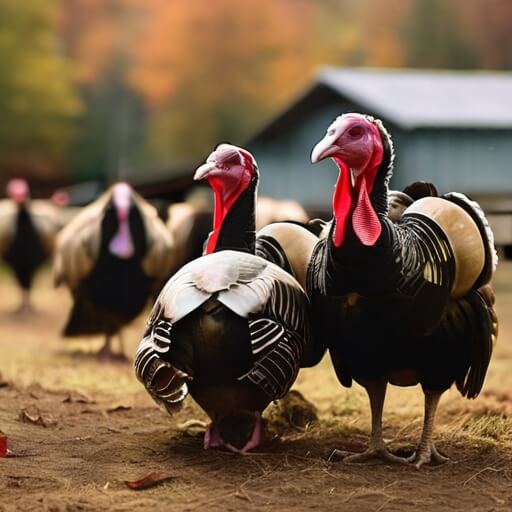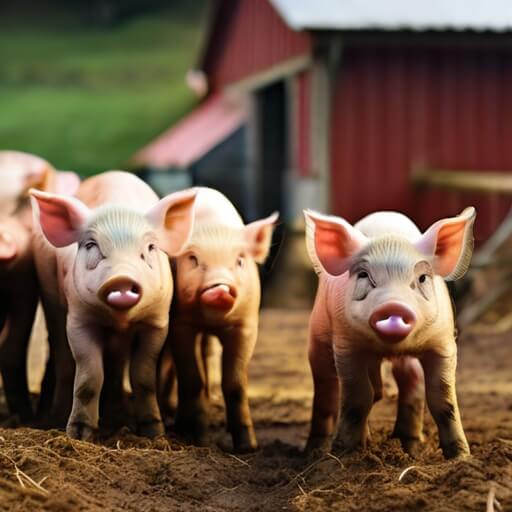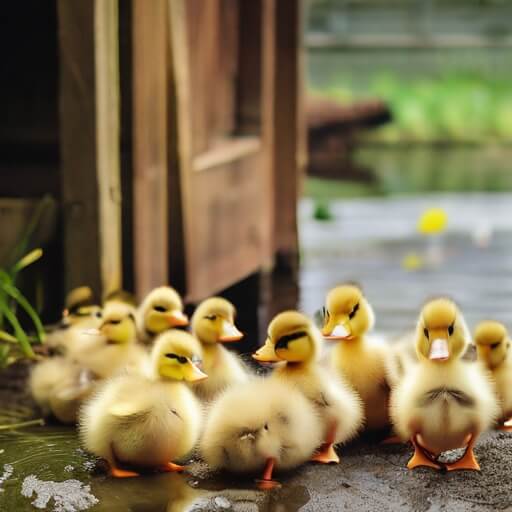Raising Geese in an Off-Grid Farm
Table of Contents
- Choosing the Right Goose Breed
- Housing and Shelter for Geese
- Goose Nutrition and Feeding
- Goose Breeding
- Goose Behavior and Compatibility
- Goose Health and Care
- Goose Products and Income
- Challenges and Solutions
- Conclusion
- FAQs
Often overlooked in the realm of homesteading, geese offer a unique blend of benefits that can significantly enhance your off-grid lifestyle. Geese are a great addition to any off-grid farm for several reasons. They are low-maintenance birds that can forage for their food, reducing the need for commercial feed. Geese are also excellent at controlling weeds and can help maintain your land without the use of chemicals. Additionally, geese are known for their loud honking, which can deter predators and alert you to any potential threats.
Let’s delve into the world of goose farming and discover how these remarkable birds can thrive on your self-sufficient property.
Choosing the Right Goose Breed
Selecting the appropriate goose breed for your off-grid homestead is essential for maximizing your goals and resources. Several factors influence the ideal breed choice, including desired products, available space, and personal preferences.
Factors to Consider When Selecting a Goose Breed
- Purpose: Define your primary goal for raising geese, whether it’s meat, eggs, down, or a combination.
- Climate: Consider your region’s climate and choose breeds that thrive in those conditions.
- Space Requirements: Evaluate the size of your property and the amount of grazing land available.
- Temperament: Some breeds are more docile than others, impacting your interaction with the geese.
- Broodiness: If you plan to hatch your own goslings, consider breeds known for their broody instincts.
Popular Goose Breeds for Meat Production
Meat breeds are typically larger and have faster growth rates.
- Toulouse: Known for its large size and meat quality.
- Embden: Another large breed with good meat yield.
- Chinese: Smaller than Toulouse and Embden but efficient converters of feed into meat.
Popular Goose Breads for Egg Production
Some goose breeds are better egg layers than others.
- Chinese: Known for their high egg production and good broodiness.
- African: Produces a moderate number of large eggs.
- Pilgrim: A heritage breed with good egg-laying ability.
Goose Breeds for Down and Feather Production
Certain breeds are prized for their down and feather quality.
- American Buff: Produces high-quality down and feathers.
- Sebastopol: Known for its curly feathers, making it a desirable breed for down production.
- Embden: While primarily a meat breed, Embdens also produce good quality down.
Housing and Shelter for Geese
Providing adequate housing and shelter is paramount for the health, comfort, and productivity of your goose flock. A well-designed space protects them from predators, extreme weather conditions, and provides a comfortable environment for rest and nesting.
Essential Features of a Goose Shelter
- Size: A general guideline is to provide at least 3 to 4 square feet of floor space per goose. However, larger breeds may require more space.
- Ventilation: Proper airflow is crucial to prevent moisture buildup and respiratory problems.
- Lighting: Natural light is beneficial, but avoid direct sunlight during hot weather.
- Insulation: Insulate the shelter to protect geese from extreme temperatures.
- Drainage: Implement a drainage system to prevent waterlogging.
- Predator Protection: Secure the shelter to protect geese from predators.
- Nesting Areas: Provide quiet and secluded areas for nesting geese.
Building a Goose Coop or Enclosure
- Materials: Consider using durable materials like wood or metal for the structure.
- Foundation: A raised foundation helps with drainage and predator prevention.
- Floor Covering: Use a thick layer of bedding for comfort and insulation.
- Perches: While geese don’t roost like chickens, providing perches can encourage them to elevate themselves.
Fencing and Pasture
- Secure Fencing: Use sturdy fencing to contain geese and protect them from predators. A height of at least four feet is recommended.
- Pasture Area: Provide ample grazing space for your geese.
- Water Source: Ensure access to clean water for drinking and bathing.
- Shade: Offer shade during hot weather.
Goose Nutrition and Feeding
Proper nutrition is essential for the health, growth, and productivity of your geese. A balanced diet that includes a variety of forages, grains, and supplements will support optimal performance.
Forage and Grazing
Geese are primarily grazers, and access to fresh pasture is crucial for their well-being.
- Grasses: Geese prefer tender grasses like clover, bluegrass, orchardgrass, and timothy. Avoid tall, coarse grasses.
- Legumes: Alfalfa and other legumes are excellent sources of protein and minerals.
- Weeds: Dandelions, chickweed, and other edible weeds can be part of their diet.
- Aquatic Plants: Geese enjoy grazing on water plants like duckweed and watercress when available.
Supplemental Feeding
While grazing should be the foundation of their diet, supplemental feeding may be necessary, especially during winter or for specific life stages.
- Hay: Timothy or alfalfa hay can be provided as a dry forage source.
- Grains: Corn, wheat, and barley can be offered as energy sources, but in moderation.
- Commercial Goose Feed: Specialized goose feeds are available, providing balanced nutrition. Popular brands include [Insert popular brands of commercial goose feed].
- Protein Supplements: For growing goslings or laying hens, consider protein-rich supplements like soybean meal or fishmeal.
- Grit: Provide grit to aid in digestion.
Vitamins and Minerals
- Commercial Goose Supplements: Many commercial goose feeds include essential vitamins and minerals.
- Mineral Blocks: Offer mineral blocks for additional supplementation.
- Oyster Shell: Provide oyster shell or crushed eggshells for calcium, especially for laying hens.
Water
Geese require constant access to clean, fresh water for drinking and bathing. Provide large, stable water containers to prevent accidents.
Can Geese Eat Chicken Feed?
While geese and chickens are both poultry, their dietary needs differ. Chicken feed is formulated to meet the specific nutritional requirements of chickens, which may not be suitable for geese.
Key Differences in Nutritional Needs:
- Protein Levels: Geese generally require higher protein levels than chickens, especially for growth and egg production.
- Fiber Content: Geese have a stronger digestive system and can tolerate higher fiber content in their diet.
- Calcium Requirements: Laying geese need higher calcium intake for egg production compared to chickens.
Potential Issues with Feeding Geese Chicken Feed:
- Nutrient Deficiencies: Chicken feed may not provide adequate levels of certain nutrients for geese.
- Digestive Problems: An imbalance in nutrient intake can lead to digestive issues.
- Obesity: Excess protein and energy from chicken feed can contribute to weight gain.
Recommendation: While small amounts of chicken feed may not harm adult geese, it’s not recommended as a primary food source. Focus on providing a diet rich in forage, supplemented with a goose-specific feed to ensure optimal health and productivity.
If you must feed your geese chicken feed, it’s essential to monitor their health closely and provide additional supplements as needed.
Goose Breeding
Successful goose breeding is essential for maintaining a healthy and productive flock. Understanding the reproductive cycle, selecting suitable breeding pairs, and providing proper care during incubation and brooding are crucial for raising healthy goslings.
The Goose Reproductive Cycle
- Mating Season: Geese typically mate in the spring, but some breeds may exhibit year-round breeding.
- Nest Building: Hens will build nests in secluded areas, often using down feathers for insulation.
- Egg Laying: Geese typically lay one egg per day for a clutch of 5-12 eggs.
- Incubation: The hen incubates the eggs for approximately 28-30 days.
- Hatching: Goslings emerge from the eggs and require immediate care.
Selecting Breeding Stock
- Healthy Birds: Choose geese free from disease and with good physical condition.
- Fertility: Select geese with a history of successful breeding.
- Temperament: Gentle and protective geese make good parents.
- Age: Most geese reach sexual maturity between one and two years old.
Goose Mating Behavior
- Pair Bonding: Geese form strong pair bonds and often mate for life.
- Aggression: During mating season, ganders can become territorial and aggressive.
- Nest Protection: Hens become fiercely protective of their nests and eggs.
Incubation and Hatching
- Artificial Incubation: If natural incubation is not desired, incubators can be used.
- Hatching Conditions: Maintain proper temperature and humidity for successful hatching.
- Gosling Care: Provide warmth, clean bedding, and a balanced diet for newborn goslings.
Challenges and Considerations
- Infertility: Some geese may experience fertility issues.
- Egg Theft: Protect eggs from predators and other animals.
- Broodiness: Not all hens will exhibit broody behavior.
- Gosling Mortality: Monitor goslings closely for health issues.
Goose Behavior and Compatibility
Geese are known for their territorial and protective nature, which can raise questions about their compatibility with other animals. Understanding their behavior is crucial for successful integration into your livestock system.
Are Geese Aggressive?
Geese can exhibit territorial and protective behaviors, especially during nesting season. While they may hiss or chase intruders, they generally pose a low risk to humans. However, it’s essential to handle geese with care and respect their personal space.
Will Geese Protect Chickens?
Geese are excellent watchdogs and can deter predators from approaching the chicken coop. Their loud honking and protective instincts make them effective guardians. However, individual personalities vary, and some geese may be more protective than others.
Will Geese Kill Chickens?
While rare, there have been instances of geese attacking and killing chickens, especially during nesting season. Proper introductions and careful monitoring can help prevent conflicts.
Will Geese Attack Dogs?
Geese are known for their courage and will defend themselves against perceived threats. While they may chase away smaller dogs, they are unlikely to harm larger breeds. It’s essential to supervise interactions between geese and dogs, especially during nesting season.
Raising Geese and Ducks Together
Geese and ducks are waterfowl and can generally coexist peacefully. They share similar dietary needs and enjoy similar environments. However, it’s important to provide ample space for both species to avoid competition.
Raising Geese and Chickens Together
While possible, raising geese and chickens together requires careful management. Geese can be aggressive towards chickens, especially during nesting season. Separating the flocks during critical periods may be necessary.
By understanding the unique behavior of geese and implementing appropriate management practices, you can successfully integrate them into your livestock system.
Goose Health and Care
Ensuring the health and well-being of your geese is crucial for a successful and productive flock. Regular check-ups, preventive measures, and prompt treatment of illnesses are essential for maintaining optimal health.
Common Goose Health Issues and Prevention
Geese are generally hardy birds, but they can succumb to various health problems.
- Parasites: Both internal and external parasites can affect geese. Regular deworming and preventative measures against lice and mites are essential.
- Respiratory Infections: Proper ventilation and clean living conditions can help prevent respiratory problems.
- Digestive Issues: A balanced diet and clean water are crucial for optimal digestive health.
- Foot Problems: Regular foot inspections and trimming can prevent lameness and foot infections.
- Eye Infections: Keep the area around the eyes clean to prevent infections.
Vaccination and Deworming
- Consult a Veterinarian: Discuss appropriate vaccinations and deworming protocols with a veterinarian experienced in poultry care.
- Regular Deworming: Implement a regular deworming schedule based on fecal exams.
- Vaccination Schedule: Adhere to recommended vaccination timelines for diseases prevalent in your area.
Hoof Care
- Regular Trimming: Trim overgrown nails to prevent lameness and infections.
- Inspection: Check for signs of injury or infection during regular hoof trimming.
Goose Products and Income
Geese offer a variety of products that can contribute to your off-grid homestead’s income and self-sufficiency. By understanding the market demand and production methods, you can capitalize on the potential of your goose flock.
Goose Meat Production
- Market Analysis: Determine the demand for goose meat in your area, considering factors like cultural preferences and local regulations.
- Processing: Learn proper butchering and processing techniques to ensure food safety.
- Product Development: Explore different cuts and products, such as goose pâté or confit.
Goose Egg Production
- Egg Quality: Focus on producing high-quality eggs with thick shells.
- Market Channels: Identify potential customers, such as local restaurants, farmers markets, or direct-to-consumer sales.
- Egg Products: Consider value-added products like goose egg omelets or quiches.
Goose Down and Feather Production
- Harvesting: Collect down and feathers during molting or after processing carcasses.
- Cleaning and Processing: Clean and sanitize the down and feathers before use.
- Product Development: Create pillows, comforters, or insulation products using goose down and feathers.
- Market Research: Identify potential buyers for your down and feather products.
Challenges and Solutions
Raising geese, like any livestock endeavor, comes with its own set of challenges. By understanding common issues and implementing effective strategies, you can overcome obstacles and ensure the success of your goose farming operation.
Predator Control
- Secure Fencing: Invest in sturdy fencing to protect your geese from predators like foxes, coyotes, and raccoons.
- Guard Animals: Consider using dogs or other livestock as guards.
- Electric Fencing: An additional layer of protection can deter predators.
- Shelter: Provide a secure shelter for geese to retreat during nighttime or inclement weather.
Disease Prevention
- Biosecurity: Maintain a clean and sanitary environment to prevent the spread of diseases.
- Vaccination: Consult with a veterinarian to develop a vaccination plan.
- Quarantine: Isolate new geese to prevent disease introduction.
- Monitoring: Regularly check geese for signs of illness.
Grazing Management
- Overgrazing: Rotate pastures to prevent overgrazing and maintain forage quality.
- Supplemental Feeding: Provide additional feed during periods of limited pasture.
- Water Quality: Ensure clean and fresh water is always available.
Aggressive Behavior
- Social Hierarchy: Establish a pecking order to minimize aggression within the flock.
- Space: Provide ample space for geese to spread out and reduce territorial disputes.
- Distraction: Offer additional enrichment activities to divert attention from aggressive behavior.
By proactively addressing these challenges, you can create a healthy and productive goose flock.
Conclusion
Raising geese on an off-grid homestead offers numerous benefits, from providing a sustainable food source to enhancing property protection. By understanding their unique needs and implementing proper care practices, you can create a thriving goose flock.
Remember, geese are intelligent and social creatures, so spending time with them and observing their behavior can be a rewarding experience. With patience and dedication, you can enjoy the many rewards of goose farming.
FAQs
1. What are the benefits of raising geese on an off-grid farm? Geese are excellent foragers, natural weeders, and provide meat, eggs, and down feathers. They can also serve as guardians for other poultry.
2. How do I choose the right goose breed for my homestead? Consider your goals (meat, eggs, weeding) and climate. Popular breeds include Toulouse, Embden, and Chinese geese.
3. What are the best goose breeds for meat production? Embden and Toulouse are favored for their size and meat quality.
4. Which goose breeds are known for high egg production? Chinese and African geese are prolific egg layers.
5. What should I consider when building a shelter for geese? Ensure it’s predator-proof, dry, and spacious. Ventilation is crucial to prevent respiratory issues.
6. How much space do geese need in their shelter? A minimum of 6-8 square feet per goose is recommended.
7. What types of food are best for geese? A diet of grass, grains, and greens is ideal. Supplement with commercial feed if necessary.
8. Can geese thrive on pasture alone? Yes, during the growing season, but supplementation may be needed in winter or drought.
9. Is it necessary to supplement geese’s diet? In winter or when grass is scarce, supplement with grains and commercial feed.
10. What are the common health issues geese face and how can they be prevented? Geese can suffer from parasites, respiratory issues, and foot problems. Clean water, dry bedding, and regular health checks are key.
11. How do you properly care for and maintain a goose’s health? Provide clean water, nutritious food, and regular health checks. Monitor for signs of illness.
12. What should I know about breeding geese? Geese typically breed in spring. Provide nesting areas and ensure proper nutrition for breeding pairs.
13. How can I successfully hatch and care for goslings? Incubate eggs at 99.5°F and 55% humidity. After hatching, keep goslings warm and provide starter feed.
14. What behavior should I expect from geese? Geese are territorial and can be aggressive. They are also social and bond closely with their flock.
15. Can geese coexist with chickens and other animals? Yes, but monitor for aggression. Separate housing may be necessary if conflicts arise.
16. What are some products and income opportunities from raising geese? Meat, eggs, down feathers, and live birds for breeding or pest control are marketable.
17. How do you handle predator control for geese? Use secure fencing, guardian animals, and lock geese in a predator-proof shelter at night.
18. What are the common challenges in raising geese and how can they be addressed? Predators, health issues, and aggression are common challenges. Proper management and secure housing are essential.
19. What are the advantages of goose down and feather production? Goose down is highly valued for its insulation properties, used in bedding and clothing.
20. How do you ensure geese have adequate water for drinking and bathing? Provide a constant supply of clean water for drinking and a separate area for bathing to keep it clean.



Thank you, your article surprised me, there is such an excellent point of view. Thank you for sharing, I learned a lot.